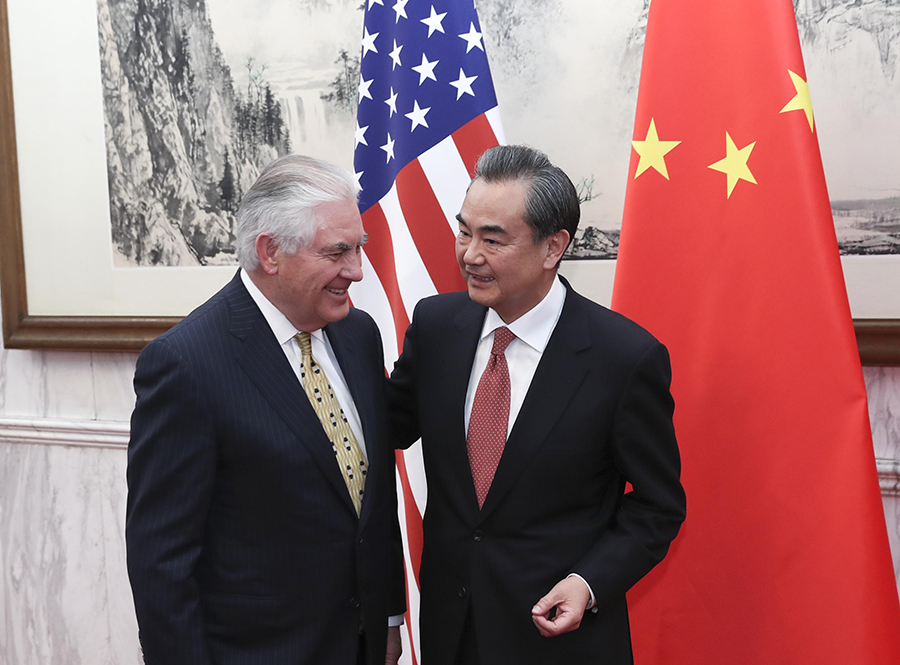Media Report

- The Washington Post reports: "While his boss was goading China over Twitter, new Secretary of State Rex Tillerson has been trying to build a constructive and 'results-oriented' relationship with the leadership in Beijing. And though his warnings about the possibility of eventual military action over North Korea have raised hackles here, Tillerson received a warm welcome from China's president on Sunday. 'You have made a lot of active efforts to achieve a smooth transition in our relationship under the new era,' President Xi Jinping told Tillerson as the men sat down for talks in the Great Hall of the People. 'And I also appreciate your comment that the China-U.S. relationship can only be defined by cooperation and friendship.' But some critics say Tillerson has bent too far, handing Beijing what Chinese news media reports are calling a 'diplomatic victory.' After meeting China's Foreign Minister Wang Yi on Saturday, Tillerson voiced Chinese catchphrases about the relationship, including the avoidance of conflict and confrontation and the need to build 'mutual respect' and strive for 'win-win' cooperation."
- The Diplomat comments: "Secretary of State Rex Tillerson's first visit to China came to a conclusion this weekend, having visited South Korea and Japan earlier in the week as part of his East Asia tour. As expected, policy options regarding North Korea were a top focus...Soon after visiting the demilitarized zone during his recent trip to South Korea, Tillerson declared that the U.S. policy of 'strategic patience' with North Korea has ended...In a strikingly differing tone over the weekend, Tillerson stated that the relationship between China and the United States was guided by 'nonconflict, nonconfrontation, mutual respect and win-win cooperation' echoing rhetoric similarly expressed by his Chinese counterpart. Furthermore, both Tillerson and Chinese Foreign Minister Wang Yi indicated a willingness to work together on the North Korean issue...The risk in taking this approach is that Trump or his administration — a few of whom have already made intransigent remarks toward Beijing during and prior to Trump's presidency — could become too adversarial and miscalculate how far they can push China. As a result, Washington could antagonize China further when China could instead be a helpful partner on North Korea."
- The New York Times reports: "A senior Chinese official on Sunday defended his country's push for greater self-sufficiency in computer chips, electric cars and other industries, calling it a necessary strategy in the face of Western countries' controls of certain high-tech gear. As the country tries to move away from low-end manufacturing, Beijing's plan, Made in China 2025, is designed to juice economic development in emerging industries by providing $300 billion in low-cost loans, research funds and other government aid. But big companies in the rest of the world worry that the program gives an unfair advantage to homegrown players, with the stated goal of Chinese companies' owning as much as 80 percent of specific domestic markets in eight years. China's minister of industry and information technology, Miao Wei, said the new policy was not meant to wall off the country's companies from outside competition. Yet he also conceded, without offering specifics, that the plan might need changes. 'We never thought about closing ourselves and doing it only at home, but I think we need some adjustments,' he said on the second day of the China Development Forum, a three-day gathering of senior Chinese economic policy makers with corporate leaders and top economists from around the world."
Calendar
- 2017-03-19 Rex Tillerson, Xi Jinping Meet In China As Secretary Of State Wraps Asia Tour
- 2017-03-17 What Should China and the US Do About North Korea?
- 2017-03-16 5 Questions Tillerson Will Have to Answer in Asia
- 2017-03-15 China to Trump: We don’t want a trade war — but if there is one, you’d lose
- 2017-03-14 Donald Trump, China’s Xi Jinping Planning to Meet Soon
- 2017-03-13 Fake China data: was it just one province?
- 2017-03-12 Schwarzman Sees Donald Trump Dialing Back Criticisms of China
- 2017-03-10 Park’s Ouster Raises Prospect of Reset With China, Kim Jong Un
- 2017-03-09 How To Decode China's Reaction To U.S. THAAD Missile Deployment In South Korea
- 2017-03-08 China wants to avert ‘head-on collision’ in the Koreas, but will Trump sign on?
News
- The Washington Post In China debut, Tillerson appears to hand Beijing a diplomatic victory
- The New York Times China Defends Plan to Bolster Its High-Tech Industries
- The Guardian Chinese maths textbooks to be translated for UK schools
- USA Today Tillerson meets with China's Xi Jinping as N. Korea tests rocket engine
- Reuters China prepares to counter any U.S. trade penalties: sources
- The Financial Times China's push to become a tech superpower triggers alarms abroad
- The Telegraph Incredible train 'disappears' through block of flats in China's 'Mountain City'
- The Wall Street Journal Forget Love: In China, I'll Marry You for Your License Plate
- BBC S Korea complains to WTO about China over Thaad
- Reuters After Saudi king, China warmly welcomes Israel's prime minister
- The New York Times China's Taxes on Imported Cars Feed Trade Tensions With U.S.
- Bloomberg Uber Rivals From Dubai, China Team Up for Ride-Hailing Alliance
- The Financial Times Call to tackle China's soaring aluminium output
Commentary
- The Diplomat Tillerson, China and the North Korea Question
- Barron's China's Hot Stock: Meitu Swings 40% In One Day
- The National Interest Singapore's Success Continues to Inspire China
- Business Insider Here are 5 maps that show the biggest limitations to China's power
- Forbes What China's New Silk Road Is Able To Teach Us About World Peace
- Fortune These Are China's Most Valuable Brands
